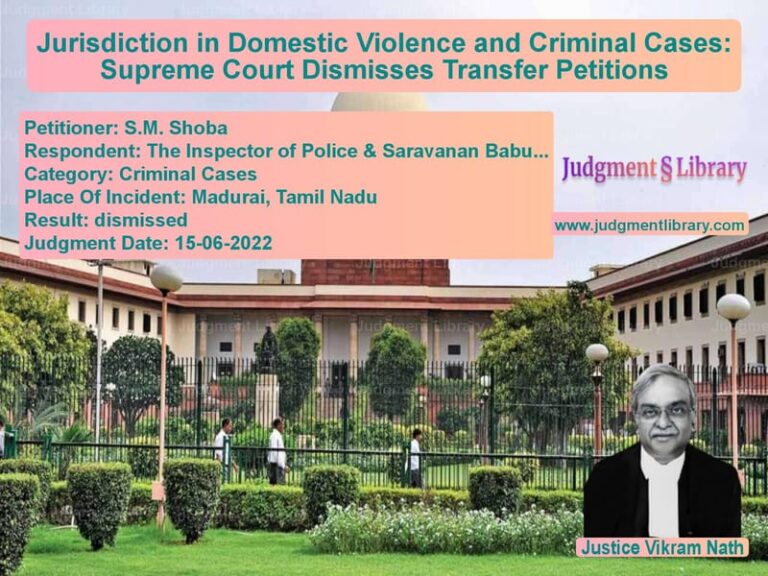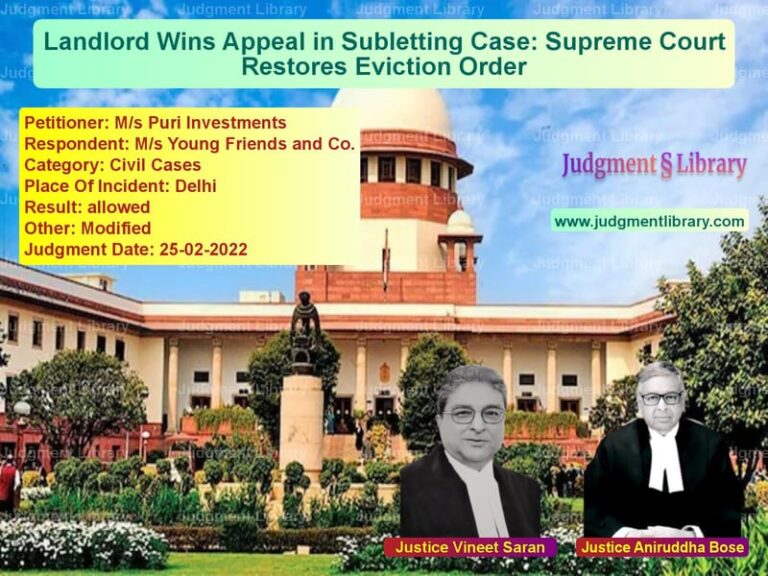Enforceability of Foreign Arbitration Awards: Supreme Court Rules on Execution Challenges
The Supreme Court of India recently delivered a landmark ruling in LMJ International Ltd. vs. Sleepwell Industries Co. Ltd., addressing critical issues surrounding the enforcement of foreign arbitration awards. The judgment examined whether the objections raised against the enforcement of foreign awards were valid under Section 48 of the Arbitration and Conciliation Act, 1996.
Background of the Case
The dispute arose between LMJ International Ltd. (petitioner) and Sleepwell Industries Co. Ltd. (respondent) over contracts related to the sale of Non-Basmati Parboiled Rice of Thailand origin. The contract was governed by GAFTA (Grain and Feed Trade Association) arbitration rules and stipulated that any disputes would be resolved under GAFTA Arbitration Rules 125 in London.
After a disagreement over the quality of rice and non-release of payments, Sleepwell Industries invoked arbitration in London. Despite receiving notices, LMJ International Ltd. did not participate in the arbitration process. The arbitral tribunal proceeded ex parte and ruled in favor of Sleepwell Industries. The respondent then filed execution petitions before the Calcutta High Court to enforce the awards.
Key Issues Before the Supreme Court
- Whether objections raised under Section 48 of the Arbitration and Conciliation Act, 1996, regarding foreign awards, were valid.
- Whether the petitioner could challenge the enforceability of the foreign award after failing to participate in arbitration proceedings.
- Whether the foreign awards were contrary to the public policy of India and could be set aside.
- Whether procedural irregularities in arbitration could impact the enforcement of the awards.
Petitioner’s (LMJ International Ltd.) Arguments
- The petitioner claimed that the arbitration clause was not properly invoked and that no attempts were made for amicable settlement before arbitration, violating GAFTA rules.
- They argued that the arbitration was conducted in a manner inconsistent with the agreement and that the arbitral tribunal lacked jurisdiction.
- The petitioner alleged that the arbitral award was obtained by fraud and corruption, making it unenforceable under Section 48.
- The petitioner contended that the award was contrary to the fundamental policy of Indian law and should not be enforced.
- They also argued that procedural lapses in appointing arbitrators rendered the award invalid.
Respondent’s (Sleepwell Industries Co. Ltd.) Arguments
- The respondent countered that the objections were raised to delay the execution of a valid foreign award.
- The petitioner had been duly notified about the arbitration proceedings but chose not to participate.
- The arbitration followed GAFTA rules, and the tribunal acted within its jurisdiction.
- The arbitral tribunal had considered all evidence, and the objections raised did not fall within the scope of Section 48.
- The objections were barred by res judicata, as similar objections had been dismissed earlier.
Supreme Court’s Observations
The Supreme Court examined the relevant provisions of the Arbitration and Conciliation Act, 1996, and ruled in favor of enforcing the foreign award. Key observations made by the Court included:
“The legislative intent of the Act is to minimize judicial interference in foreign arbitral awards, allowing enforcement unless it falls within the narrow exceptions of Section 48.”
“The objections raised by the petitioner are not sufficient to deny enforcement of the foreign award. The petitioner had ample opportunity to present its case before the tribunal but failed to do so.”
“The argument that the arbitration clause was improperly invoked is baseless. The arbitration process was conducted under GAFTA rules, which the petitioner had agreed to abide by.”
Key Findings of the Supreme Court
- The Court ruled that the objections were barred by the principle of res judicata, as they had been raised and rejected previously.
- The arbitration process followed the agreed contractual terms, and the petitioner’s claims of fraud and corruption were unsubstantiated.
- The petitioner could not challenge the award on grounds that were within its control during arbitration but were not raised at the appropriate stage.
- The Supreme Court upheld the enforceability of the foreign awards, directing the High Court to execute them.
Impact of the Judgment
The ruling has significant implications for foreign arbitration and enforcement in India:
- It strengthens India’s pro-arbitration stance, minimizing judicial interference in foreign awards.
- It clarifies that objections to enforcement must be raised at the appropriate stage and not as an afterthought.
- It reinforces that procedural irregularities alone cannot be a ground for denying enforcement unless they meet the strict criteria of Section 48.
Conclusion
The Supreme Court’s judgment in LMJ International Ltd. vs. Sleepwell Industries Co. Ltd. reinforces India’s commitment to honoring foreign arbitral awards in line with international standards. By dismissing the petitioner’s objections, the Court reaffirmed that enforcement of foreign awards should not be obstructed by technical objections raised at a late stage. This ruling strengthens investor confidence in India’s arbitration framework and provides greater clarity on the limited grounds available for challenging foreign awards.
Petitioner Name: LMJ International Ltd..Respondent Name: Sleepwell Industries Co. Ltd..Judgment By: Justice A.M. Khanwilkar, Justice Ajay Rastogi.Place Of Incident: India.Judgment Date: 20-02-2019.
Don’t miss out on the full details! Download the complete judgment in PDF format below and gain valuable insights instantly!
Download Judgment: LMJ International Lt vs Sleepwell Industries Supreme Court of India Judgment Dated 20-02-2019.pdf
Direct Downlaod Judgment: Direct downlaod this Judgment
See all petitions in Arbitration Awards
See all petitions in International Arbitration
See all petitions in Enforcement of Awards
See all petitions in Judgment by A M Khanwilkar
See all petitions in Judgment by Ajay Rastogi
See all petitions in dismissed
See all petitions in supreme court of India judgments February 2019
See all petitions in 2019 judgments
See all posts in Arbitration and Alternate Dispute Resolution Category
See all allowed petitions in Arbitration and Alternate Dispute Resolution Category
See all Dismissed petitions in Arbitration and Alternate Dispute Resolution Category
See all partially allowed petitions in Arbitration and Alternate Dispute Resolution Category







